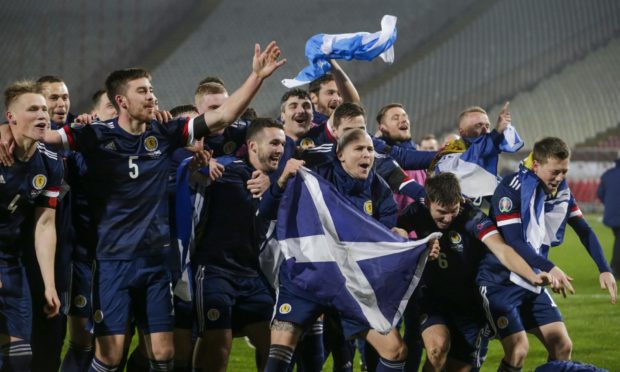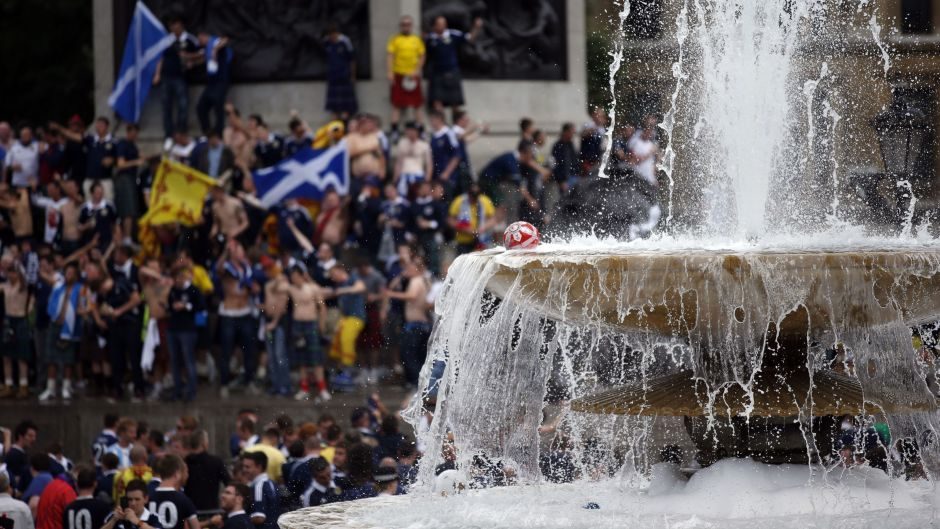Some pundits have claimed the spectacular failure of Ally MacLeod’s football team in Argentina more than four decades ago was a factor in Scotland failing to secure devolution in the 1979 referendum.
Undoubtedly, the success or otherwise of the Scotland football team can play an enormous part in dictating the national mood. That much has been evident in the few hours since the nail-biting, but victorious, penalty shoot-out against Serbia.
But is it possible that the return of our national side to a major competition for the first time since the 1998 World Cup will have an impact on the constitutional question that dominates Scottish politics?
Looking ahead to what promises to be a football-obsessed summer dominated by the fortunes of Steve Clarke’s side, a mouth-watering fixture against the Auld Enemy and the antics of the Tartan Army (Covid permitting), we asked an academic who has studied the links between sport and politics.
Sport and politics
Dr Stuart Whigham of Oxford Brookes University has studied the relationship between football and nationalism and unionism as well as feelings of Britishness and Scottishness during the 2012 Olympics and 2014 Commonwealth Games.
Dr Whigham said he felt that success on the football pitch could feed into the political dynamic, but ultimately the independence debate would come down to more fundamental questions about the economy.
“If you’d asked me 15 years ago if the feelgood factor from sports would feed into political decisions I might have been more circumspect,” said Dr Whigham, who was brought up in Edinburgh.
“But I do think there are some ways in which a feelgood factor or sense of confidence does have a tiny relationship between sport and politics.
“I think, post the 2014 independence referendum, Scottish people have a bit more of a secure identity and confidence politically and now we have finally got something on the football front to be confident about as well.
“I think they can feed into each other a little bit – just in a sense of confidence and feelgood factor, but it would be a bit daft to overinflate it or overestimate how much of a difference it makes.”
The hard question
Dr Whigham said footballing confidence “does lend itself to the pro-independence vote”.
But he said: “I think, broadly speaking, though, Scotland has been developing confidence politically over the last 20 years since devolution. It now looks at what’s happening in the UK and down south and sees the fact that in many ways there is no reason why Scotland can’t be running themselves.
“So it then comes down to… but should we do it based on the economic implications of it? And that’s the hard question, at the end of the day.”
He added: “It’s when you look at the pennies, what might happen to the pound, pensions and all that sort of stuff. That’s the stuff that really matters, more than football.”
So although a feelgood atmosphere created by a summer of football would feed into the mix, it would not ultimately be a decisive political factor.
“For the swing voter or the not particularly politically engaged voter it might be just one of those things that trades on the psychology of those things,” the academic said. “But it is important not to overestimate the impact it might have.”
He added: “I did research on the 2014 Commonwealth Games. It was a roaring success, but did that make a difference when it came to September (when the referendum was held)? I doubt it.”
Dr Whigham was asked about the still-sore subject of how the Scottish football team travelled to Argentina in 1978 with great expectations only to return in disgrace (save for a magnificent Archie Gemmill goal).
I haven't felt that good since Archie Gemmill scored against Holland in 1978! #NoScotlandNoParty pic.twitter.com/uH40dhXGum
— Daren Frankish (@dfrankish) November 13, 2020
His view was that there were other more fundamental factors at play when it came to the 1979 Devolution referendum.
“That first devolution referendum was more down to the George Cunningham intervention than Argentina,” Dr Whigham said.
In the end, a narrow majority voted in favour of devolution (51.6% to 48.4%). But the turn-out only represented 32.9% of the Scottish electorate.
An easier prediction to make is that politicians of all persuasions will seek to capitalise on any success Scotland achieves on the football pitch.
“Without a shadow of a doubt they will want to align with public sentiment,” Dr Whigham said. “They all try to get political capital out of it in lots of different ways.”


